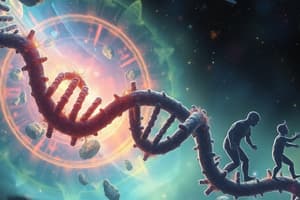Podcast
Questions and Answers
Which process is responsible for the formation of distinct species arising from an initial single ancestral species?
Which process is responsible for the formation of distinct species arising from an initial single ancestral species?
- Genetic drift
- Natural selection
- Speciation (correct)
- Mutation
What is the primary mechanism driving natural selection according to evolutionary theory?
What is the primary mechanism driving natural selection according to evolutionary theory?
- Mutation
- Genetic drift
- Environmental pressures (correct)
- Random mating
Which evolutionary force results in the loss or increase of certain alleles due to random fluctuations in population size?
Which evolutionary force results in the loss or increase of certain alleles due to random fluctuations in population size?
- Natural selection
- Speciation
- Genetic drift (correct)
- Random mutations
What aspect of evolution helps in favoring advantageous adaptations within species?
What aspect of evolution helps in favoring advantageous adaptations within species?
What is the fundamental concept that forms the backbone of modern biology by explaining the change in characteristics of populations across generations?
What is the fundamental concept that forms the backbone of modern biology by explaining the change in characteristics of populations across generations?
How do isolating mechanisms contribute to the process of speciation?
How do isolating mechanisms contribute to the process of speciation?
Which scientific field focuses on the comparison of genomes, proteins, and phenotypic features to elucidate the origins of biodiversity?
Which scientific field focuses on the comparison of genomes, proteins, and phenotypic features to elucidate the origins of biodiversity?
What does the study of evolution provide a foundation for, according to the text?
What does the study of evolution provide a foundation for, according to the text?
How do molecular comparisons among DNA sequences contribute to evolutionary studies?
How do molecular comparisons among DNA sequences contribute to evolutionary studies?
Which technique do researchers use to investigate evolutionary patterns and processes?
Which technique do researchers use to investigate evolutionary patterns and processes?
How does the field of evolution impact agriculture according to the text?
How does the field of evolution impact agriculture according to the text?
What do paleontological surveys reveal about fossils, as mentioned in the text?
What do paleontological surveys reveal about fossils, as mentioned in the text?
Flashcards are hidden until you start studying
Study Notes
Exploring Evolution in Biology
Evolution—the change in characteristics of populations across generations—is a fundamental concept that forms the backbone of modern biology. Researchers studying evolution delve deeply into the mechanisms driving natural selection, genetic variation, adaptation, and speciation to better understand life's history and diversity.
Mechanisms of Evolution
At the heart of evolution lies Darwinian natural selection, where traits conducive to survival and reproduction are passed along to future generations due to environmental pressures. Random mutations generate genetic variability within species, while natural selection acts upon this variety to favor advantageous adaptations. Genetic drift occurs randomly during population fluctuations, resulting in the loss or increase of certain alleles, altering gene frequencies among populations. These forces continuously shape living beings, creating new species via a process called speciation.
Speciation
Speciation refers to the formation of distinct species arising from an initial single ancestral species. Isolating mechanisms prevent individuals from mating and exchanging genes with others, allowing unique traits to accumulate within geographically separated populations. Over many generations, these isolated populations diverge genetically, eventually evolving into separate species.
Evidence Supporting Evolution
An overwhelming body of evidence supports the theory of evolution. Paleontological surveys reveal that fossils gradually transition from simple lifeforms to increasingly advanced structures. Comparative morphology and embryology demonstrate striking parallels amongst distantly related species, suggesting shared evolutionary heritage. Lastly, molecular comparisons among DNA sequences indicate homologies shared among distantly related organisms.
Application in Research
Researchers utilize experimental strategies and computational tools to investigate evolutionary patterns and processes. By comparing genomes, proteins, and phenotypic features among closely and distantly related taxa, biologists elucidate the origins of biodiversity and gain insights into human disease mechanisms. Moreover, evolution shapes our perspectives on ecology, conservation, and agriculture, guiding preservation efforts and shaping agricultural breeding programs.
In summary, evolution provides the foundation for understanding life's diversity, history, and potential trajectory. Studying evolution enables biologists to decipher nature's intricate tapestry, fostering curiosity, innovation, and progress in areas spanning from basic research to applied sciences.
Studying That Suits You
Use AI to generate personalized quizzes and flashcards to suit your learning preferences.




